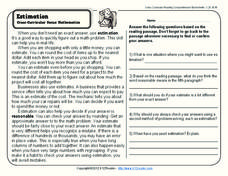K12 Reader
Comparative & Superlative Practice
When should you use more and most when writing adverbs? Practice comparative and superlative adverbs with a review worksheet. After reading through the information at the top of the page, kids decide if they should use the comparative or...
K12 Reader
Comparative & Superlative Practice II
Grammar practice gets good, better, and best! Choose when to use comparative and superlative forms of various adverbs in 12 sentences. Examples at the top of the page guide kids to select the best form based on how many people or items...
K12 Reader
Antonyms are Opposites
Knowing the opposite of your chosen word is a great step in improving your word choice. Young readers select an antonym from the provided word bank to complete a series of 14 sentences.
K12 Reader
Playground Antonyms
There are opposites all around you, even at school! Using an antonym word bank with playground-themed words, young learners complete sentences opposite in meaning from the ones provided.
K12 Reader
Antonym Animals
What's the antonym for wild? What's the opposite of young? Young readers identify the antonyms in a series of ten sentences. Next, they jot down the word pairs to reinforce the relationship between each set of antonym.
K12 Reader
Habitat Destruction
What happens when an animal becomes endangered or extinct? Explore the ways that human influence throughout the environment has threatened the existence of other species with a reading passage. After reading the paragraphs, kids answer...
K12 Reader
In Danger of Extinction
What happens when a species becomes extinct? Sharpen your reading skills with a passage about how koalas have gotten close to being an endangered species.
K12 Reader
Classifying Triangles
Bring math and reading informational text together with a reading comprehension lesson. After kids read about isosceles, scalene, and equilateral triangles, they answer five comprehension questions to demonstrate how they can use context...
K12 Reader
Galileo and His Telescope
Learn about Galileo Galilei's contribution to modern science with a reading passage that focuses on reading comprehension. After kids read several paragraphs about his life, they answer five questions about the information they have just...
K12 Reader
Why Does the Moon Orbit Earth?
Have you ever looked up at the moon and wondered why it looks different every night? Learn about the moon's orbit and the lunar cycle with a reading comprehension exercise. Using context clues, kids find the definitions of unfamiliar...
K12 Reader
The Scientific Method
Introduce the scientific method with a reading comprehension activity. Have kids read a few paragraphs that describe the process of making a hypothesis, gathering evidence, and taking notes that will support the experiment.
K12 Reader
Estimation
When is it a good idea to use estimation? Learn about estimation and rounding with a reading comprehension lesson. After kids read a passage about estimation, they answer five comprehension questions on the other side of the page.
K12 Reader
Community Connections
Who helps our community run smoothly? Read a short passage about community members and helpers. After kids finish the passage, they answer five short questions on the other side of the page.
K12 Reader
National Symbols
What are the most prominent symbols of the United States? Learn about the bald eagle, the American flag, and the Statue of Liberty in a reading comprehension activity that includes a short passage and five reflective questions.
K12 Reader
United States Geography
Encourage reading for information with a text about United States geography. Kids read a short passage about the landforms in the United States, including mountain ranges and natural resources, and answer five reading comprehension...
K12 Reader
Three Levels of Government
Help your learners work their way through a reading assignment for informational text. Using context clues, they answer five comprehension question based on a short passage about the three levels of government: local government, state...
Grammar Net
A, An, Some, Any
Practice a, an, some, and any with a straightforward worksheet. Kids fill in the blanks for 20 sentences, using context clues and their knowledge of each word.
Grammar Net
Prepositions
Add a activity about prepositions and context clues to your grammar unit. As kids read 20 sentences, they fill in the blanks based on what they read and the prepositions that fit the best.
Grammar Net
Adjectives of Comparison
Is our car bigger than theirs? Is this car better than than that one? Use comparative and superlative adjectives of provided verbs to complete twenty sentences.
Grammar Net
So v. Such
When should you use such and when should you use so? Kids look through 20 sentences and fill in the blanks with so, such, such a, or such an.
Grammar Net
Numbers 1-30
Jot down some figures with an activity about printing numbers. First, learners fill in the blanks with the numbers next to their printed forms. Then, they complete simple addition and subtraction problems with numbers that are written out.
K12 Reader
Metaphors Compare Things
This worksheet on metaphors is your ticket to better writing! As learners read ten sentences, they underline the metaphor and circle the two objects of comparison.
Worksheet Web
Interrogatives and Auxiliary Verbs
Interrogatives—who, what, where, when, why, and how—are the focus of a grammar worksheet that reinforces writing questions and using auxiliary verbs.
Worksheet Web
Heteronyms
Challenge scholars to identify and use heteronyms in a sentence with a two-page worksheet designed to boost grammar skills.
Other popular searches
- Language Arts
- Art and Music
- Arts Music
- Art Lessons
- Art History
- Arts and Crafts
- Art Lessons Primary
- Arts and Crafts Movement
- Visual Arts
- 5th Grade Language Arts
- 3rd Grade Language Arts
- 4th Grade Language Arts

























